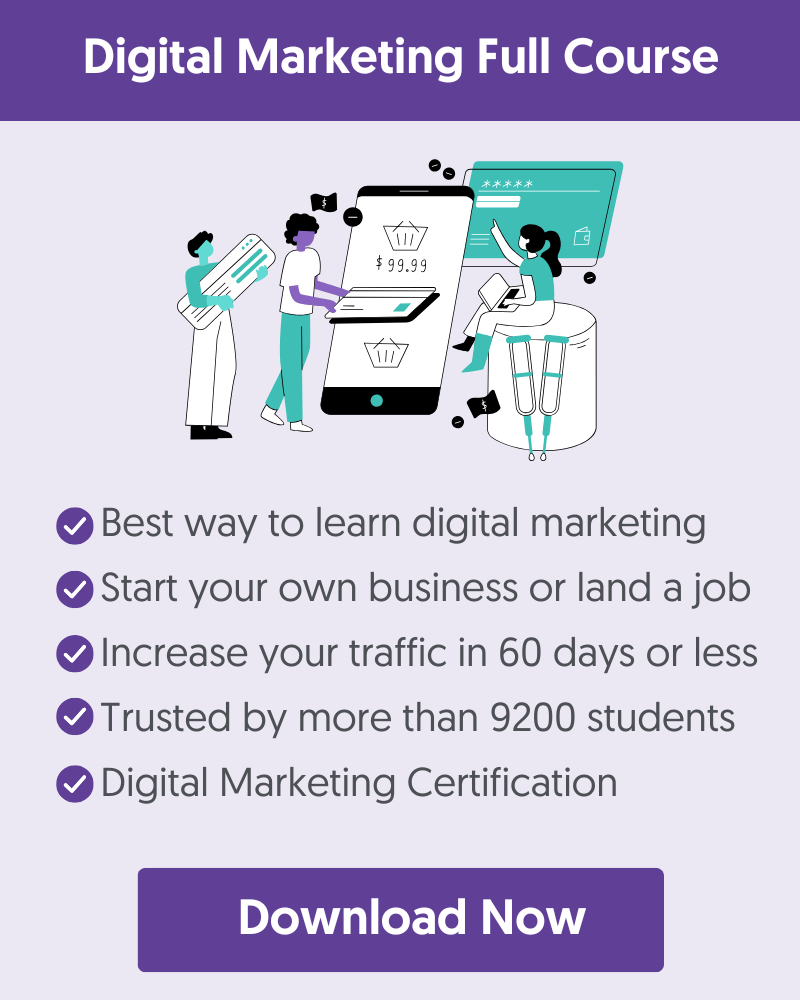To rank your website higher on Google, you must learn how Google SEO works. Enrolling in a good SEO course is the fastest path to success.
In this post, we’ll review the 10 most popular Google SEO training courses. Our list includes official Google SEO courses and training classes offered by accredited SEO academies.
Let’s take it from the beginning.
Does Google offer an SEO course? Google offers five SEO courses prepared by Google professionals and delivered by Google training academies and third-party providers. Most of the courses are free and include SEO advice from Google.
How do I get Google SEO certification? Google does not offer an official Google SEO certification. You can follow any official Google SEO courses to learn SEO, but there is no way to become Google SEO Certified.
Google offers several professional certifications, including a Google Digital Marketing and eCommerce Professional Certificate, but not an SEO certification.
If you want to become certified in SEO, you can pursue a third-party SEO Certification.
10 Top Google SEO Courses
- Attract and Engage Customers (Google)
- Help Customers Find You Through Search (Google)
- Search Engine Optimization Starter Guide (Google)
- The Complete SEO Course (Reliablesoft)
- Google SEO Fundamentals (UCDavis)
- Introduction to Google SEO (Coursera)
- Google SEO Training Masterclass (Udemy)
- Rank in Google With SEO (Udemy)
- Search Engine Optimization Courses (LinkedIn)
- SEO Certification Course (HubSpot)
1. Attract and Engage Customers (Google)
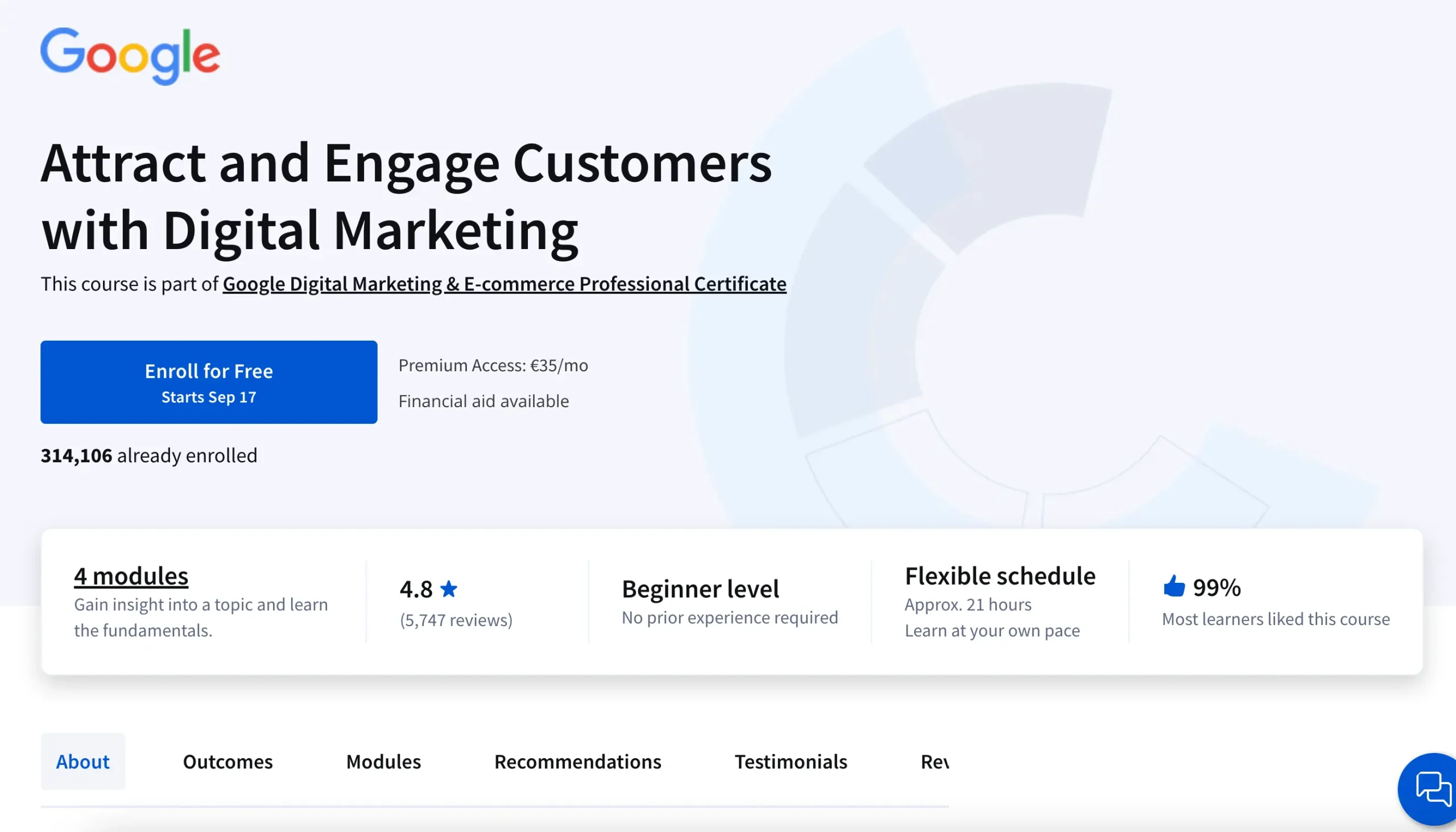
- Cost: $49
- Duration: 21 hours
- Certificate: Yes
Attract and Engage Customers is the second course in the Google Digital Marketing & eCommerce Professional Certificate that Google offers through Coursera.
Despite the confusing name, this course is all about Google SEO. Taught by Google professionals, the course has two lessons about SEO: Understand search engine optimization (SEO) and Apply search engine optimization (SEO).
In a total of 21 hours, you’ll learn how Google approaches SEO. In particular, it covers the following topics:
- Fundamentals of SEO
- How does the Google search engine work?
- How does Google rank websites?
- Anatomy of Google search results (SERPs)
- Search algorithms
- How to do keyword research for SEO
- Website structure and navigation
- SEO Glossary
- Optimizing a website’s content
- Optimize images for SEO
- Structured Data Markup and SEO
- Introduction to Google Search Console
- Mobile-friendly websites
- How to use tools and reports of Google Search Console
- Bing Webmaster Tools
What about certification?
You can register for this course, finish all lessons and graded assignments to get a certificate of completion (that’s not an SEO certification) or enroll in the Google Digital Marketing & E-commerce certificate (that includes 6 more courses) and get the Google Digital Marketing & eCommerce professional certificate.
Cost and Duration
The cost to enroll in the individual Google SEO Course is $49/month through a Coursera Plus Subscription. The total time required to complete the course is just 21 hours so you can finish it within a month.
The cost to enroll in the professional Google certificate is again $49/month, but it will take you 6 months to complete all 7 courses, so the total certification cost will be around $234.
Coursera offers a 7-day trial to review the course material before committing to a paid plan.
We took this course the first week it was released. As mentioned in our review, it’s a good course for beginners in Google SEO. It does not share any secrets or strategies that are not already known, but it gives SEO advice you would expect from Google.
The cost is reasonable, and it is recommended that anyone take this course either to refresh their basic SEO skills or just out of curiosity to learn how Google approaches SEO.
2. Help Customers Find You Through Search (Google)
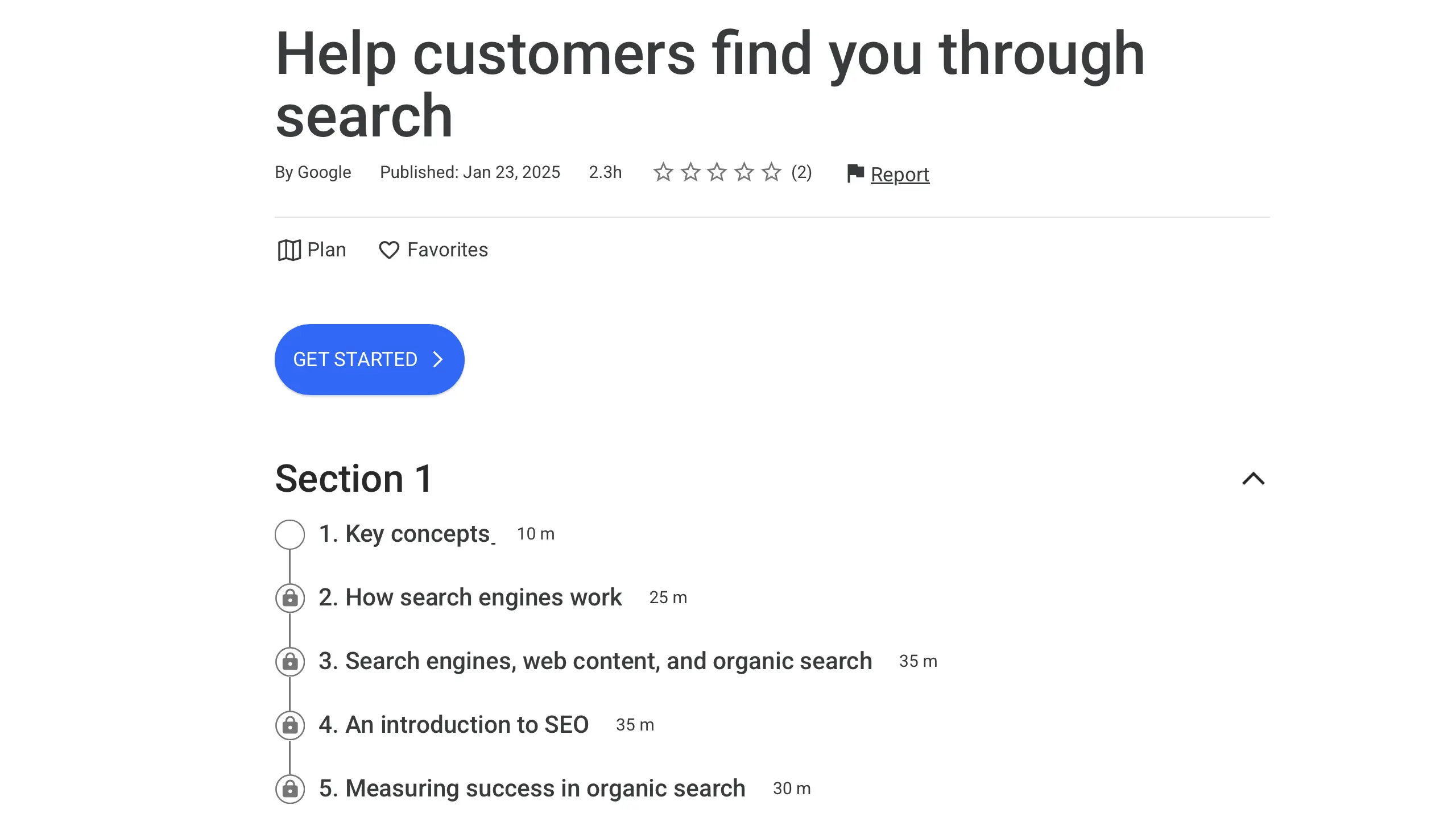
- Cost: Free
- Duration: 2 hours
- Certificate: No
The Help Customers Find You Through Search is another Google SEO course you can consider. It is offered as part of the Fundamentals of Digital Marketing course through Google Digital Garage (now part of Google Skillshop).
The course is free and it consists of 5 lessons with a total duration of 2 hours.
It covers the following topics:
- Search engine basics
- How search engines work
- Search engines, web content, and organic search
- An introduction to SEO
- Measuring success in organic search
It's an interactive course (not video), and the material is prepared by Google experts.
This is also suitable for SEO beginners as it only scratches the surface of how to properly optimize your website for the best possible exposure in Google search results.
What about certification?
This course does not offer a certificate of completion.
It’s an introductory SEO course covering the fundamentals of SEO. The lessons are short, and the learning format is engaging. It provides beginners value, but this is not a full-blown SEO course. Since it’s free and only takes a couple of hours to complete, you can enroll in the course and check it out yourself.
3. Search Engine Optimization Starter Guide (Google)
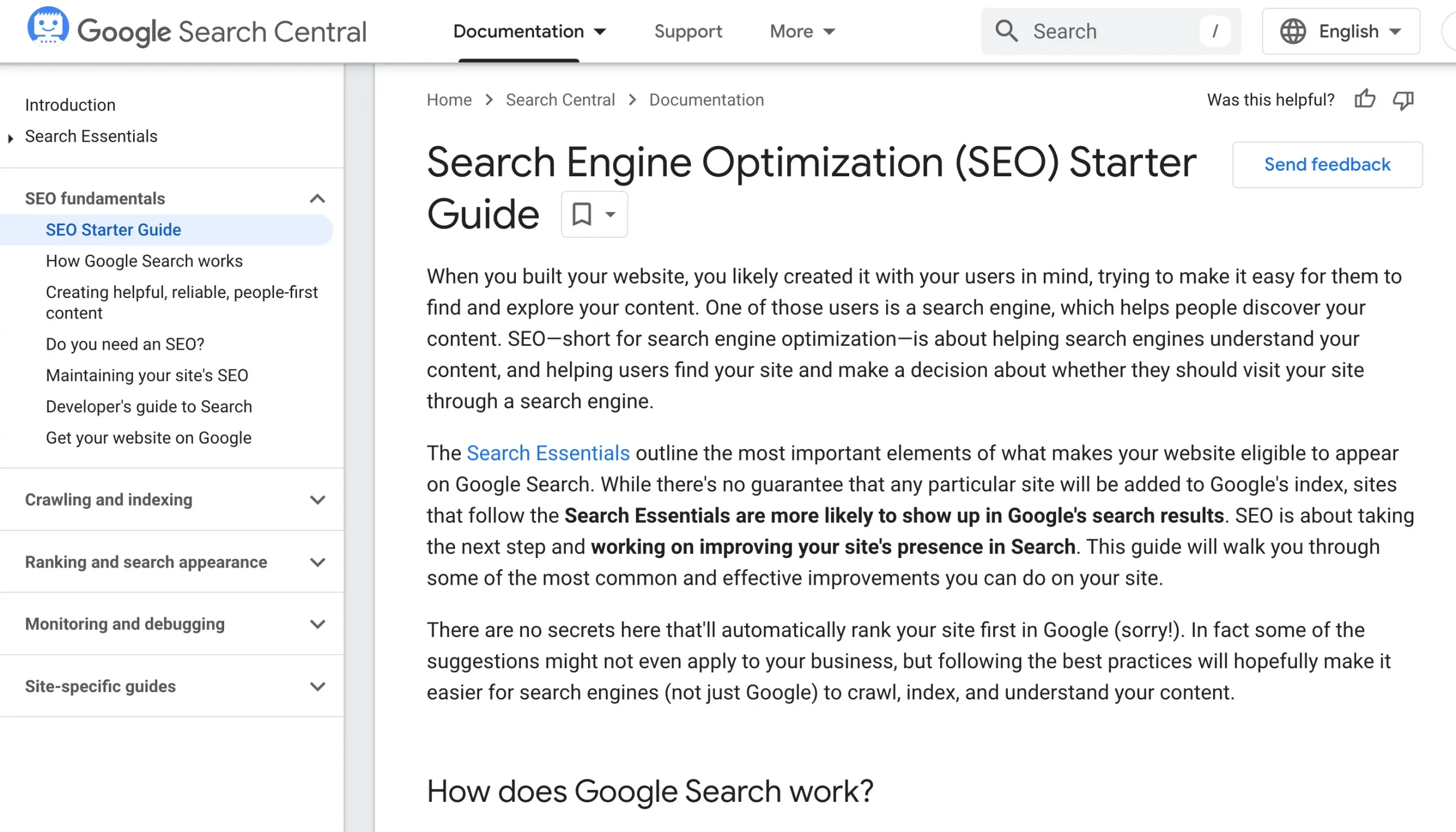
- Cost: Free
- Duration: Self-Paced
- Certificate: No
The third and final official Google SEO training is not actually a course but an online resource you can access for free.
The SEO Starter Guide has been around for a decade and was one of Google’s first SEO resources. It was recently updated and is now part of the Google Search Central website.
This guide does not include training videos, but its content is comprehensive and covers all areas of SEO. It includes several examples and tips on what you should and should not do to keep your website in good SEO shape.
In the “Promote your Website” section, it does mention the importance of reaching out to other similar websites and opening up a communication channel with them,
What about certification?
This is an online guide that offers no certification.
Everyone should read the SEO starter guide at least once. It will take you less than one hour, but it is a good reminder of what Google SEO is all about.
4. The Complete SEO Course (Reliablesoft)

- Cost: $89
- Duration: Self-Paced
- Certificate: Yes
The first non-official Google SEO Course on our list is the Complete SEO Course by Reliablesoft Academy.
It’s a comprehensive course that covers basic, intermediate, and advanced SEO concepts. The course was originally released 3 years ago, but it’s updated several times per year to stay current with the latest changes in the Google search algorithm.
The lessons are prepared and delivered by an SEO expert with almost two decades of experience in the SEO industry.
The main difference between this course and the official Google SEO Courses is that you’ll learn not only the theory but techniques you can use to get real measurable results with SEO.
In the course, you’ll learn tips and techniques that Google does not want to tell you, and it’s packed with blueprints and step-by-step instructions you can follow to get your website in the top positions of the search results.
In particular, you’ll learn:
- How to perform a technical SEO audit of your website and fix any errors
- How to optimize the content of your web pages (on-page SEO)
- How to run off-page SEO campaigns and get results (you’ll learn techniques besides the traditional SEO advice - build good content and links will come).
- How to perform keyword research and find the right keywords to target with content
- How to do SEO for eCommerce Websites
- How to measure the results of your SEO campaigns with Google Analytics
What about certification?
You can get an SEO Certification upon completing the course lessons and passing an exam. On average, it takes students a week to finish the lessons and get certified.
This course costs $89 (once-off payment) and is offered as part of the SEO Course Bundle, which includes four courses covering SEO, eCommerce SEO, Keyword Research, and Google Analytics.
To avoid being biased, you can read hundreds of student reviews submitted by the 9200+ students who already registered for the course and got their SEO certification.
To prove our confidence in our training classes, your purchase is covered by a 60-day money-back guarantee.
5. Google SEO Fundamentals (UCDavis)
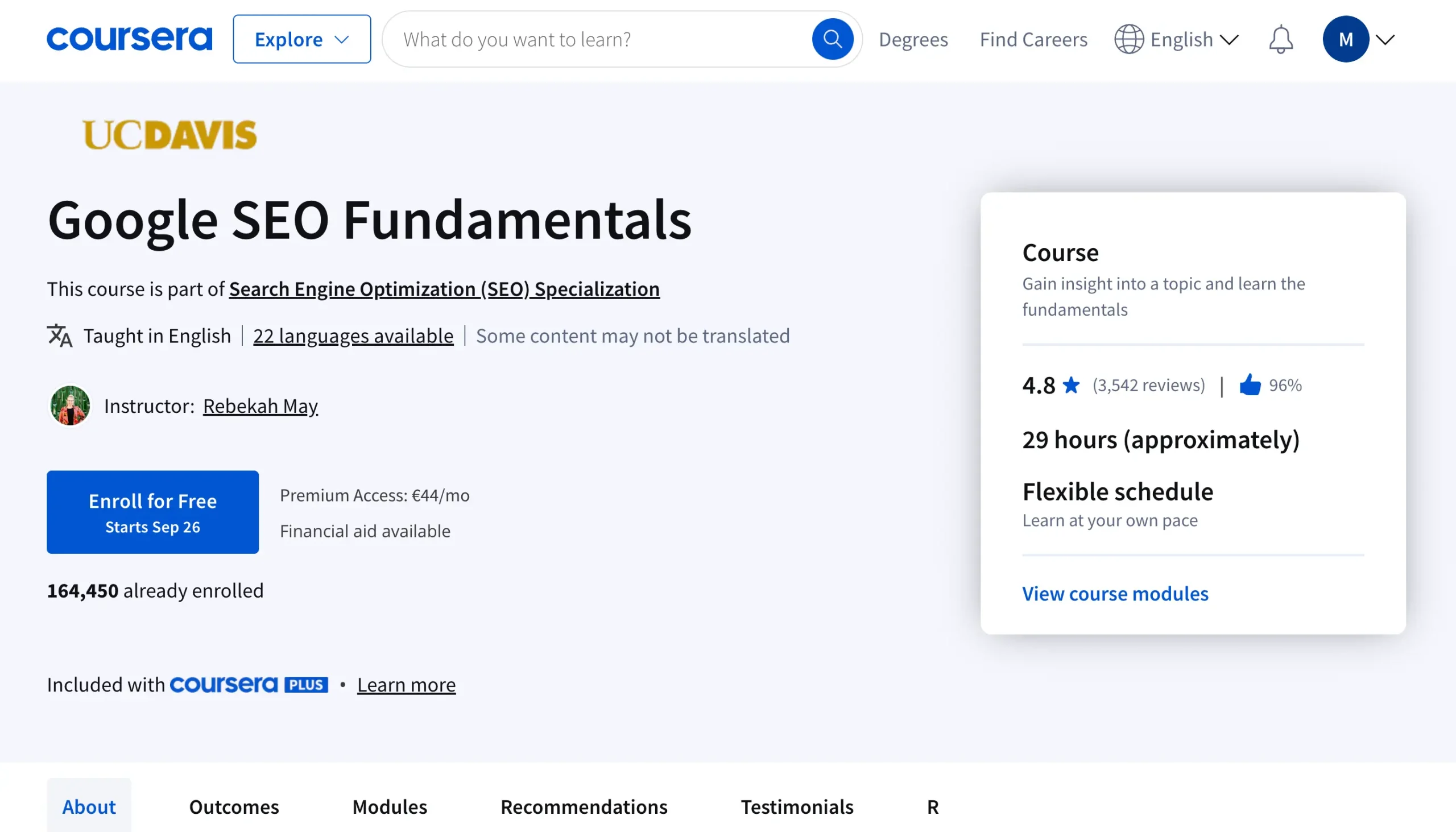
- Cost: $49
- Duration: 29 hours
- Certificate: Yes
Another third-party course worth considering is the Google SEO Fundamentals course offered by UC Davis University via Coursera.
You can take this as a standalone course or register for the Coursera Search Engine Optimization (SEO) Specialization, which includes four more courses.
The course is taught by Rebekah May (an industry-recognized SEO expert) and includes four lessons. The total time investment required to finish this course is around 29 hours.
During the course lessons, you’ll learn:
- Introduction to On-page SEO
- Introduction to Off-page SEO
- Introduction to Technical SEO
- Keyword Theory & Research
This is a paid course that costs $49 per month. Before committing to a paid monthly subscription, you can use the 7-Day Trial period offered by Coursera to check out the course material.
What about certification?
You can complete the course and get a certification of completion or enroll in the SEO specialization, complete all courses, and get an SEO certification from Coursera and UCDavis.
To finish the SEO certification, you’ll have to allocate around 5 months, and the total cost will be around $245.
It’s a good course for beginners. It explains in detail how SEO works and the most important ranking factors. The only concern is that the course was initially released 5+ years ago, and there is no evidence that the lessons have been revised to include how Google SEO works this year.
6. Introduction to Google SEO (Coursera)
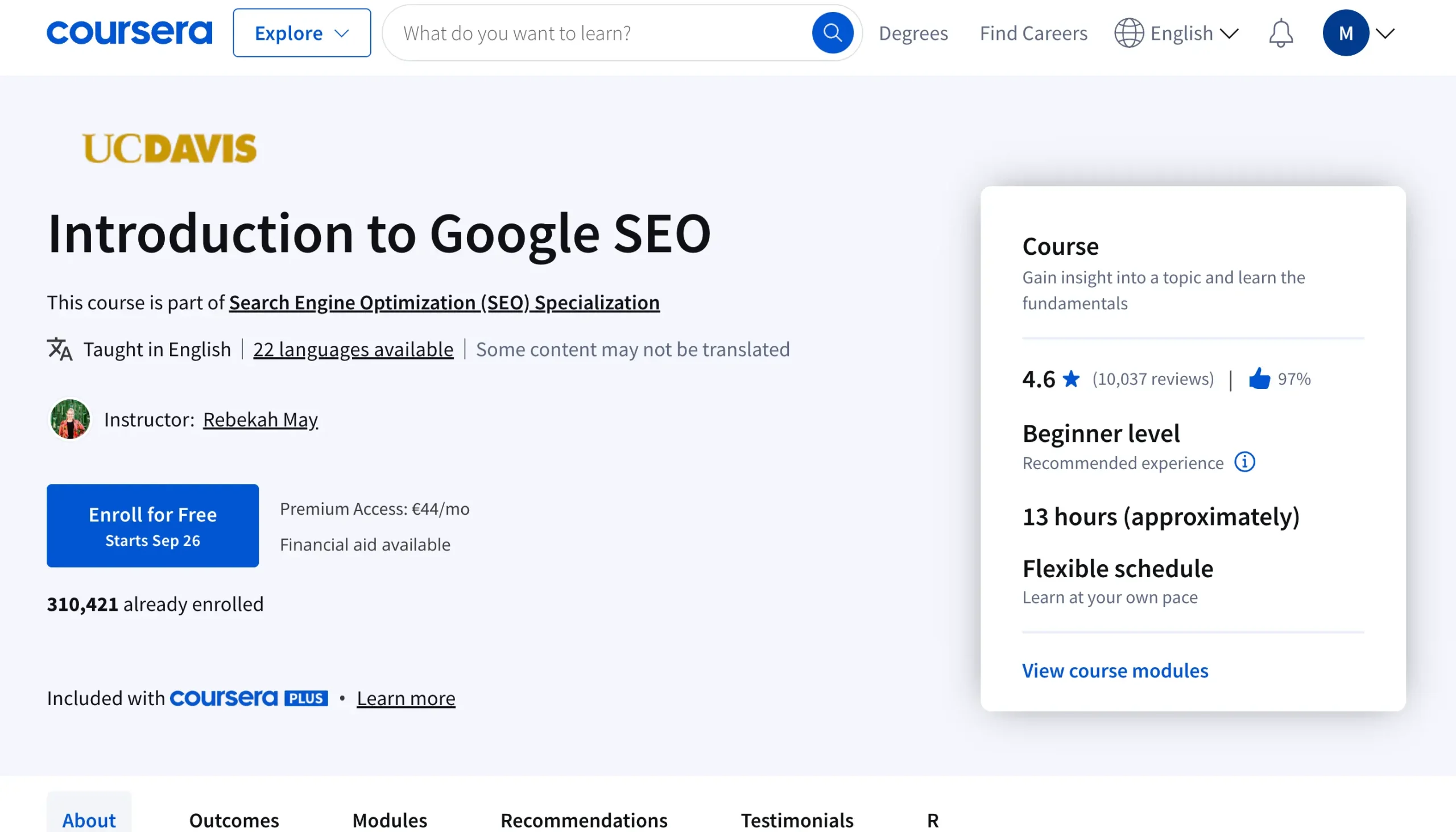
- Cost: $49
- Duration: 13 hours
- Certificate: Yes
The Introduction to Google SEO is the second course in the Coursera SEO certification worth exploring.
It’s another course for beginners prepared by UCDavis trainers and delivered by Coursera.
In the 13 hours of taught material, broken down into four lessons, you’ll learn:
- How Search Engines Work
- Evolution of SEO
- Current SEO Best Practices
- Introduction to Search Engine Algorithms
- SEO Best Practices and Ranking Factors
- Core Web Vitals
- EAT & YMYL
- Featured Snippets and Rich Snippets
- Evolution of Keyword Optimization
- Strengthening Your Keyword Strategy
- How Does Branding Influence Website Rank?
What about certification?
Upon completing the course and passing all graded assignments, you can get a course completion certificate from Coursera. To get an SEO certification, you need to enroll in the Search Engine Optimization (SEO) Specialization.
If you’re looking for a course to understand how modern SEO works, this is a good course to consider. It’s one of the few courses that touch on topics related to SEO practices that emerged in the last few years, such as the concept of Core Web Vitals, EAT & YML, and branding.
7. Google SEO Training Masterclass (Udemy)
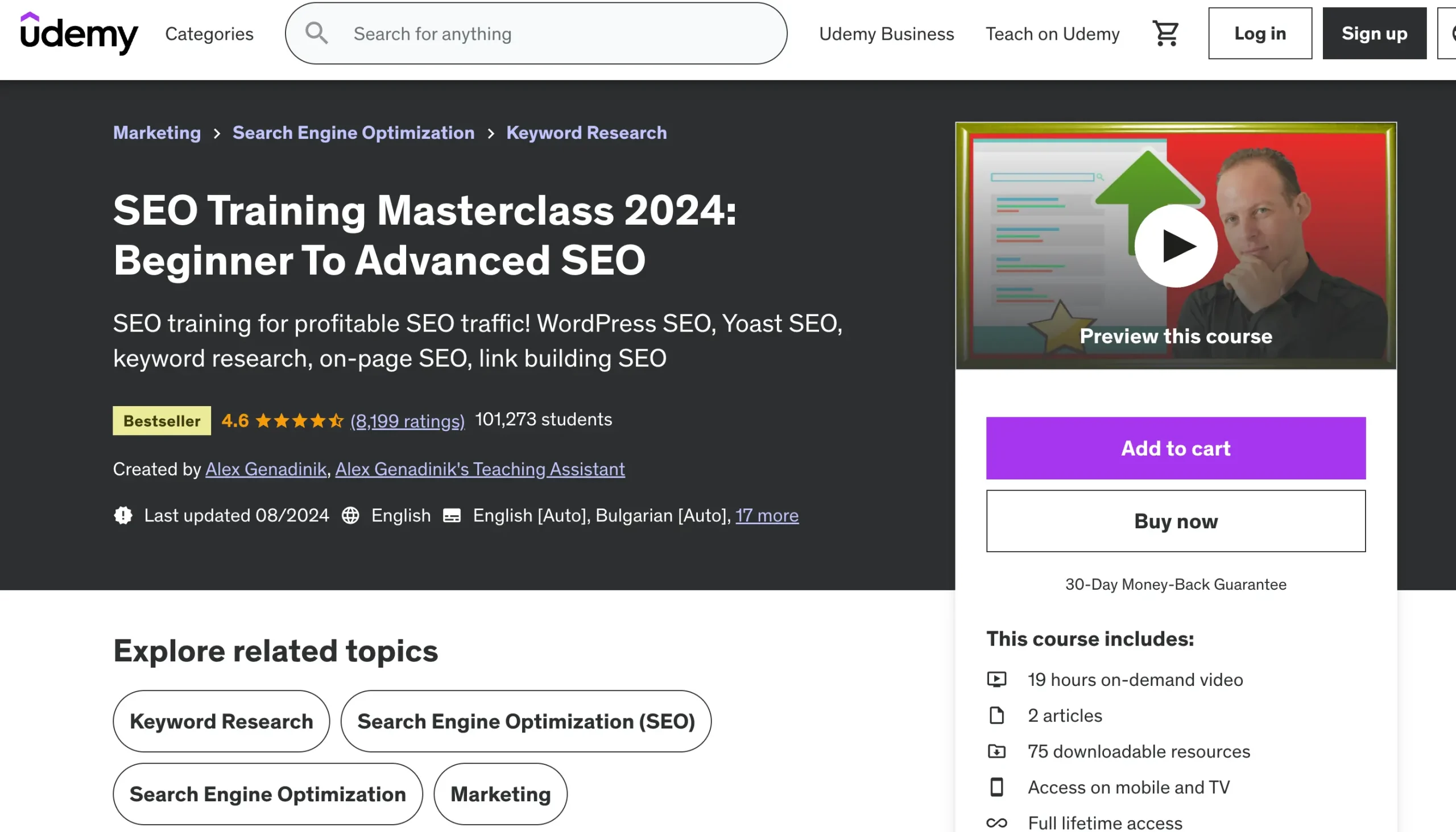
- Cost: $99
- Duration: 19 hours
- Certificate: Yes
An Udemy course that covers Google SEO in detail is the SEO Training Masterclass: Beginner SEO To Advanced SEO by Alex Genadinik. Alex is a successful trainer with many best-selling courses on Udemy.
In this course you’ll learn:
- How to do SEO for your own website or as a freelancer
- How to rank your pages higher on Google and other search engines
- How to create a solid SEO strategy for your business
- How search engines work (including Google and YouTube)
- How to work with SEO on WordPress, Shopify, and Wix
What about certification?
The course is 19 hours long and comes with a certificate of completion (not a Google SEO Certification).
This is one of the best SEO courses on Udemy, with thousands of students and 4.6 ratings. The course lessons are laid out in a logical manner and besides the theory you’ll learn how to work with tools like Semrush, to carry out important SEO tasks. Alex also gives advice on how to find clients, if you decide to start your own SEO business.
8. Rank in Google With SEO (Udemy)

- Cost: $99
- Duration: 9.5 hours
- Certificate: Yes
The last course for learning Google SEO from a third-party provider is the Rank in Google With SEO course offered by Udemy.
In 9.5 hours of on-demand video, you’ll learn practical steps on how to SEO your website to increase your visibility on Google. In particular, you’ll learn:
- How to pick a niche for your website
- How to find SEO keywords
- How to keep visitors to your website for more time
- How to get backlinks for your website
- How to run SEO audits
- How to improve your Googe EAT score
What about certification?
Once you finish the course, you’ll get a proof of completion certificate.
Although this is a good course and was included in our list because it contains useful information on SEO, we don’t “approve” the link-building advice offered in this course. Our approach to off-page SEO and link building is different, but apart from that, everything else that the course teaches is solid SEO advice.
9. Search Engine Optimization Courses (LinkedIn)
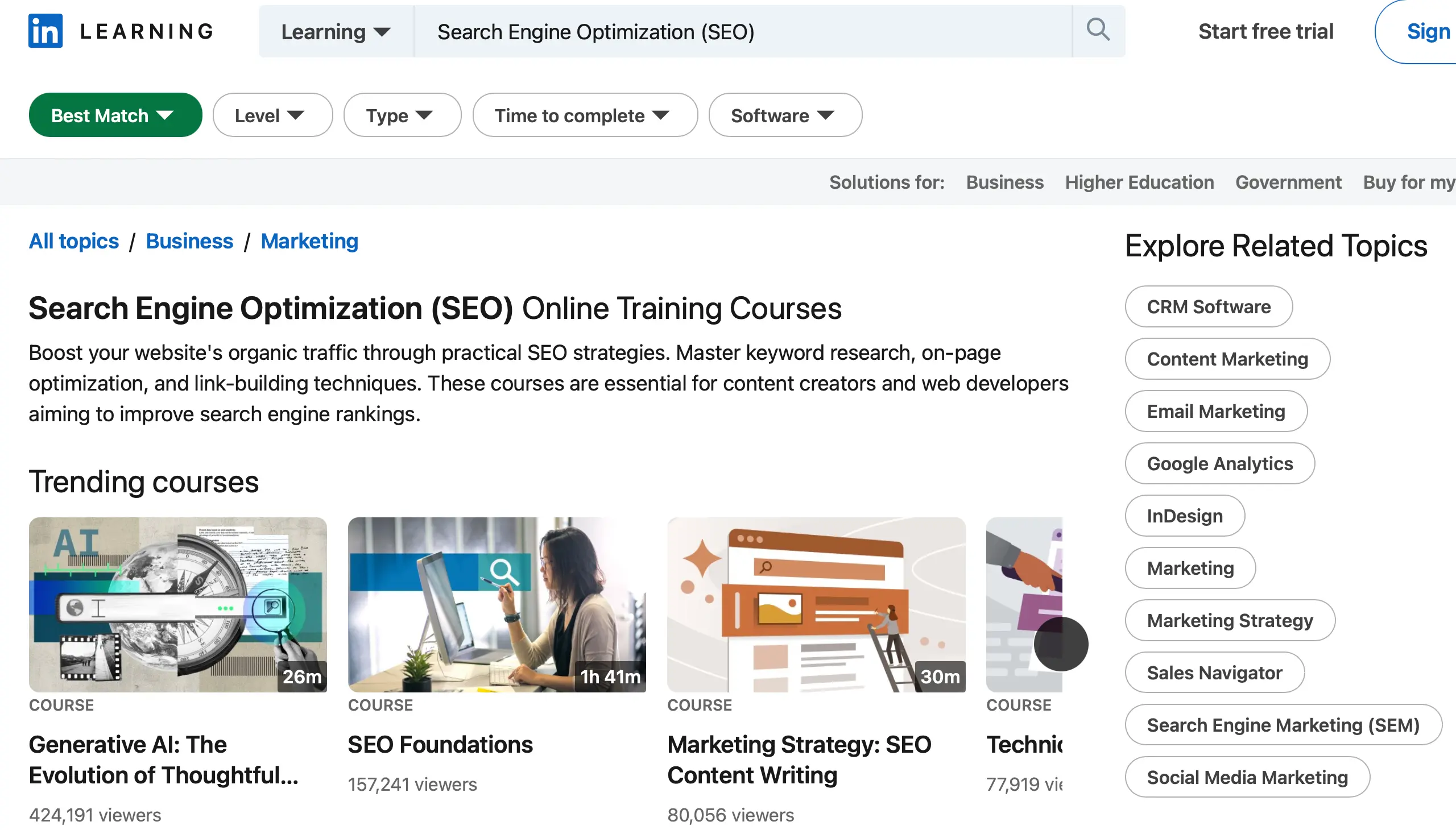
- Cost: $39/mo
- Duration: Self-Paced
- Certificate: Yes
LinkedIn Learning offers several Google SEO courses to improve your website’s organic traffic through practical SEO strategies. The courses cover topics such as keyword research, on-page optimization, and link-building techniques.
Some of the most popular courses include “SEO Foundations” by David Booth, “Technical SEO” by Dana DiTomaso, and “SEO Copywriting: Crafting Content for Both Humans and Search Engines” by Maddy Osman.
What about certification?
You can get a certificate of completion after finishing each course.
LinkedIn Learning offers a comprehensive library of SEO courses suitable for all skill levels. It's a good platform for anyone wanting to learn about SEO at their own pace.
10. SEO Certification Course (HubSpot)
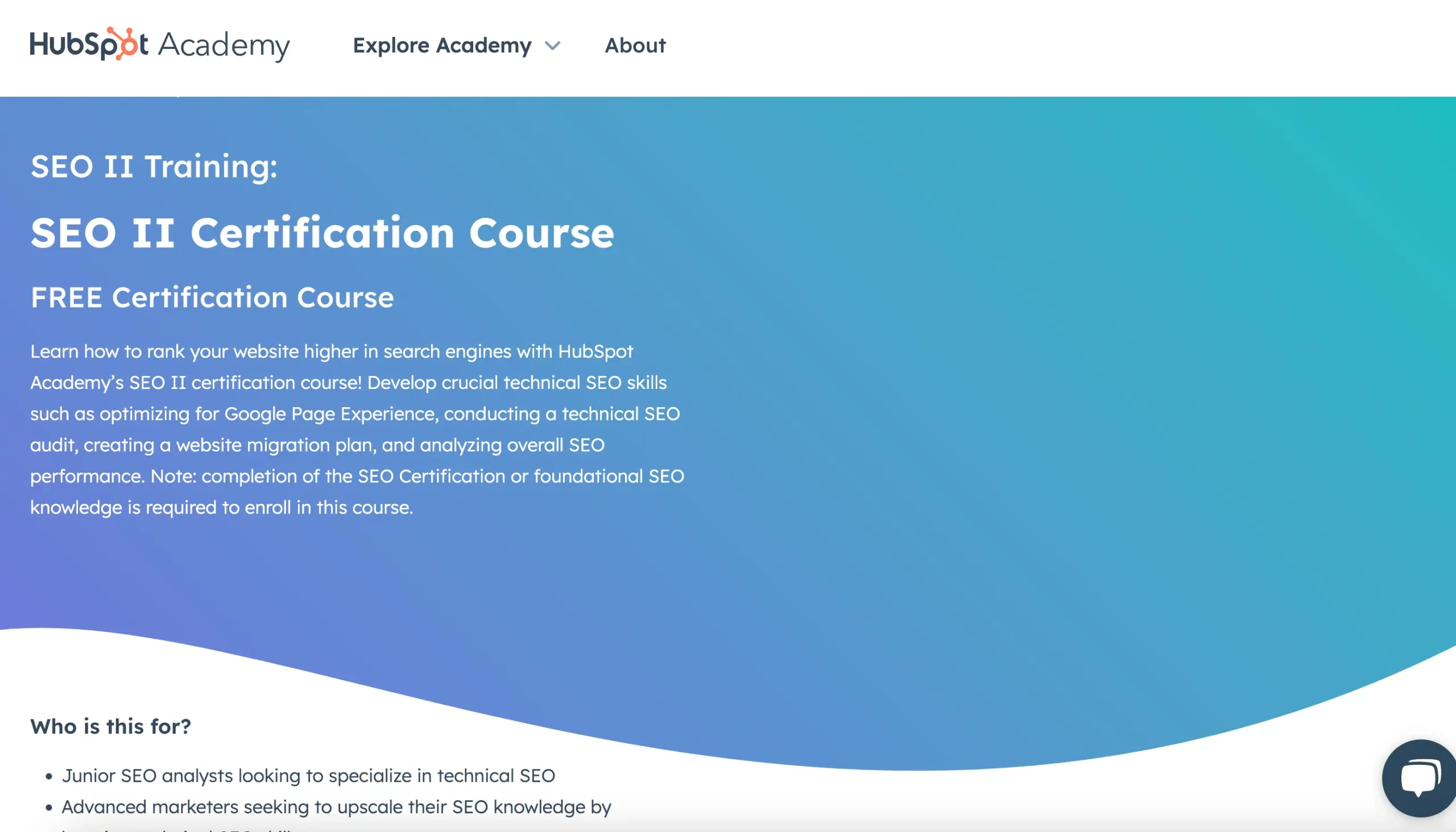
- Cost: Free
- Duration: 3.5 hours
- Certificate: Yes
The HubSpot SEO Certification Course is designed for anyone looking to improve their SEO skills. It includes six lessons and just over three hours of material.
- SEO Basics
- On-Page and Technical SEO
- Keyword Research For SEO
- Link Building for SEO
- Optimizing Your Website For Rich Results
- SEO Reporting
You’ll learn how to optimize your site for better user experience and search engine visibility while also mastering the steps involved in conducting a comprehensive technical SEO audit.
What about certification?
To earn the certification, you must complete all lessons, making it a short but valuable course for marketers, developers, or business owners looking to elevate their SEO game.
The HubSpot SEO Certification Course is a good choice for beginners and intermediate marketers who want to build a strong foundation in technical SEO. It’s concise, practical, and offers real-world insights that can be immediately applied to improve website performance.
Which Google Certification Is Best For SEO?
There is no official Google certification for SEO. However, the Reliablesoft SEO Certification and the Coursera SEO Specialization are two great choices among the certifications provided by third-party training academies.
Is a Google SEO Certification Worth It?
Yes, going through SEO training and getting a certification is certainly worth it. A course will help you learn SEO faster than any other method. Good courses, like the ones listed above, offer a structured way of learning so you have a clear learning path to follow without wondering what you should learn first and what to do next.
Obtaining an SEO certification will not make you an SEO expert, but it’s proof that you understand the basics and your commitment to continuous learning and improvement.
Methodology
If you search for “Google SEO courses” or “Google SEO Certification” in Google, you’ll notice that in the “People Also Ask” sections, users wonder if there is an official Google SEO Course and certification you can pursue.
From the results given by Google, it is confusing what the case is and that’s why we created this post. Our goal is to help users understand that Google offers SEO training courses and two digital marketing certifications but NOT an SEO Certification.
In the above list, we included 10 courses. The first five are ALL the Google official SEO Courses and the rest are courses from other institutions that are worth considering.
As part of our ongoing work as a digital marketing academy, we’ve registered for ALL courses (Google and third-party) and gone through all the lessons. What you can read above is our expert opinion.
Related Courses and Certifications
For more SEO and Digital Marketing training options, you can consider these posts:
- Best Digital Marketing Courses - a list of premium (and free courses) on digital marketing. Most of the courses have dedicated lessons on SEO.
- Digital Marketing Certifications - If you want more than SEO certification, going after a digital marketing certification is the best career choice you can make.
- SEO Courses - if you want to explore more SEO courses, you can check out this list of free courses.
- Is SEO Hard to Learn? - a learning plan on how to approach SEO learning, especially if you’re starting out now.
